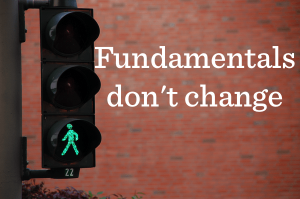
As a working professional, social media can present an internal challenge: we want to get out there and have fun and talk about our personal interests, but we also want to play it cool for that ‘professional’ side of us. The good news is, you can do both. Keeping it professional on social media doesn’t mean you have to compromise who you are and what you like.
Below I included a few of the core tips I’ve learned over the past few years – both personally and via the very public mistakes we see in the headlines. Bear with me as I proceed to sound like your social media mom.
Assume everyone can see everything. This is a good one to start with as a foundation. Sure there are privacy options, and you can have ‘protected’ accounts, but you should operate under the assumption that anything you post can be seen. For example, you may have a private Twitter account, but someone following you can manually retweet something you say. Or you post a photo to Instagram via your private account, but someone shares the link on his or her public one. Anyone who clicks it can see it. You just never know. Better safe than sorry. It’s all about a little thing called “good judgment” and using it, people.
The delete button is a lie. Don’t believe what they tell you. Delete only works in the movies. Maybe you have one too many drinks one night and say something not-so-kosher on social media. The next morning you delete it quicker than you can reach for that Advil. Wrong. It’s too late. Your tweet or post has already been screenshot, sent to your boss and shared all over the place. The truth is, social media posts can be immortal. Just ask a few people who have learned the hard way.
Be an expert on your privacy options. Every network has its own set of privacy options. Sometimes you risk going cross-eyed trying to figure out which setting needs to be adjusted where. Regardless, it’s a good idea to know what options exist out there – whether it’s who can view your content, how people can find you or what information will be shared. Social is what you make of it, and you can use networks for different purposes. Your privacy settings will help you do that.
That said, I would caution about being too closed off. If you want to protect all your accounts and keep things super private, that’s your call. It can be limiting in interacting with others on social that are outside your group of friends. (It still amazes me to see how many people with private Twitter accounts don’t realize that @ replying someone who doesn’t follow them is basically the same thing as talking to a wall.)
Don’t be afraid to show personality. Being professional doesn’t mean you have to be bland. Think about it – do you want to follow someone who just tweets out headlines and sounds like a robot? No! Don’t be that person. That person is boring. If you were to stop by my Twitter account on a random day, you’d see a healthy dose of sarcasm with a mix of hockey and a pinch of industry talk. Again, it all comes down to using your best judgment and being smart about things. I don’t post anything I wouldn’t say to people in real life. But having a voice and letting people know who you are can help make social media what it’s supposed to be: social.
Be searchable. For many people, one of the big components of the professional side of social media is networking. You have the chance to connect with people at tons of different companies. Making yourself searchable will help in the quest for growing your network. This goes for any social channel, but especially for Twitter and LinkedIn – use keywords in your bios or profiles that you would like to be found for. On Twitter, feel free to use handles (for example, I have @shiftcomm in my bio as my employer. When people search for SHIFT, I pop up as a result) or hashtags. Just don’t overdo it and #have #your #entire #bio #be #full #of #hashtags.
Get involved. There’s that whole ‘social’ part of social media that can really help you make the most of your experience. Aside from interacting with who you are following and followers, there are proactive ways to get involved professionally on social. LinkedIn Groups are a great way to find industry-related discussions and jump in with your own questions or advice. Twitter chats still exist and can be another opportunity to engage with people in the industry. If you’re nervous about jumping in the first time, just hang around and check out what’s being said. Then dive right in.
Disclose or pay. Literally. I may have saved this for last, but it’s one of the more important points to remember. Always, always, always disclose any client-related information you share. For example, if you’re sharing an announcement from a company you’re working with or you’re promoting a campaign that a client is running – do not forget to include a #client or (This is a client). It doesn’t matter how you say it, but you must say it. The FTC is willing and ready to hand out hefty fines for those who get caught doing the opposite.
What other tips do you have?
(222)






